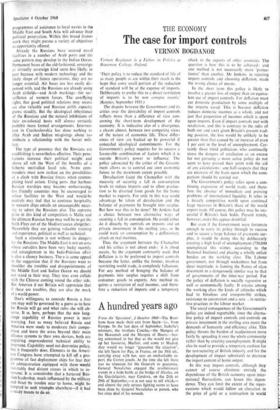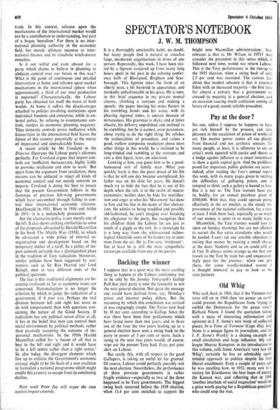The case for import controls
THE ECONOMY VERNON BOGDANOR
Vernon Bogdanor is a Fellow in Politics at Brasenose College, Oxford.
`Their policy is to reduce the standard of life of as many people as are within their reach in the hope that some small portion of the reduction of standard will be at the expense of imports. Deliberately to prefer this to a direct restriction of imports is to be non compos mends.' (Keynes, September 1931.)
The dispute between the Government and its critics over the desirability of import controls reflects more than a difference of view con- cerning the short-term development of the economy. It is indicative also of a divergence, a chasm almost, between two competing views of the nature of economic life. These differ- ences of view are backed up by powerful if concealed ideological commitments. For the Government's policy requires for its success a favourable combination of factors which it is outside Britain's power to influence. The policy advocated by the critics of the Govern- ment allows us to control our own economic future to the maximum extent possible.
Devaluation faced the Chancellor with the necessity of securing a fall in consumption levels to reduce imports and to allow produc- tion to be diverted from goods for the home market to exports. For only in this way could advantage be taken of devaluation and the balance of payments be brought into surplus. But how was this to be done? Mr Jenkins had a choice between two alternative ways of securing a fall in consumption. He could either do it directly by controls on imports and on private investment in the sterling area, or he could work on consumption by a deflationary attack on real incomes.
Thus the argument between the Chancellor and his critics is not about ends: it is about means. So the argument commonly used, that deflation is to be preferred to import controls because the latter, unlike the former, involves restricting world trade, is completely fallacious. For any method of bringing the balance of payments into surplus requires a shift from consumer goods to exports. Any method re- quires a restriction of real incomes, and there- fore a reduction of imports and a temporary
check to the exports of other countries. The question is how this is to be achieved : and one method is not necessarily more 'protec- tionist' than another. Mr Jenkins, in rejecting import controls and choosing deflation, made the wrong choice of means.
In the short term this policy is likely to involve a greater loss of output than an equiva-
lent use of import controls. For deflation must cut domestic production by some multiple of the imports saved. This is because deflation reduces domestic incomes as a whole, and not just that proportion of incomes which is spent upon imports. Even if import controls met with retaliation, and this is contrary to the rules of
both nor and GATT given Britain's present trad- ing position, the loss would be unlikely to be
greater than that caused by an increase of even 1 per cent in the level of unemployment. Cer- tainly those timid politicians who continually stress the dangers of retaliation as an excuse for not pursuing a more active policy do not seem to have proved their point with the aid of any calculations: one half-suspects that they are unaware of the basis upon which the com- parison should be carried out.
The Government's policy relies upon a con- tinuing expansion of world trade, and there- fore the absence of immediate and pressing problems of international liquidity. It relies in a fiercely competitive world upon continual large increases in Britain's share of the world export trade. Of course, this policy may be suc- cessful if Britain's luck holds. Present trends, however, make this appear doubtful.
But even if the Government were fortunate enough to carry its policy through to success and to secure a large balance of payments sur- plus, it would be doing this by deliberately creating a high level of unemployment (750,000 unemployed this winter, according to the National Institute) and placing a wholly unfair burden on the working class The Labour government, not through wickedness but from
sheer ineptitude, is fanning the flames of class discontent in a dangerously similar way to that
of governments of the inter-war period. For the policy of deflation is socially regressive as well as economically faulty. It creates among the working class the kinds of attitudes which lead to frivolous and irresponsible strikes, resistance to automation and a retu... to restric- tive practices in the labour market.
The social consequences of the Government's policy are indeed regrettable, since the alterna- tive policy of import controls and controls on private investment in the sterling area meets the demands of humanity and efficiency alike. This policy throws the burden of readjustment more fairly by spreading it over the whole community rather than by creating unemployment. It might also be used to provide a temporary cushion for the restructuring of British industry and for the development of import substitute's to decrease the import content of home output.'
In this way import controls, although they cannot of course eliminhte entirely the dependence of the British economy upon inter- national fluctuations, can lessen this depen- dence. -They can limit the extent of the reper- cussions which would follow an alteration in the price of gold or a contraction in world
trade. In this context, reliance upon the mechanisms of the international market would not be a contribution to understanding, but part of a bogus 'moralism.' For there is no inter- , national planning authority in the economic field, but merely ultimate recourse to inter- national finance and its ritualistic witch-doctor remedies.
Is it not wilful and even absurd for a party which claims to believe in planning to abdicate control over our future in this way? What is the point of continuous and detailed intervention at home and reliance upon market mechanisms in the international sphere when approximately a third of our total production is exported? Characteristically, the Labour party has obtained for itself the worst of both worlds. At home it suffers the disadvantages attached to policies involving restrictions upon individual freedom and enterprise, while its ex- ternal policy, by refusing to countenance con- trols, renders its economic planning nugatory. Thus domestic controls prove ineffective while laissez-faire in the international field leaves the future of this country potentially at the mercy of impersonal and unpredictable forces.
A recent article by Mr Crosland in the Director illustrates the Labour party's dilemma perfectly. For Crosland argues that import con- trols are 'inefficient, bureaucratic, highly liable to provoke retaliation and slow to work.' But apart from the argument from retaliation, these reasons can be adduced to reject all kinds of economic control and not merely controls on imports. Crosland is doing his best to ensure that the present Government follows in the footsteps of previous left-wing governments which have succumbed through failing to con- trol their international economic relations. MacDonald in 1931, Blum in 1936 and Attlee in 1951—it is a melancholy procession.
But the alternative policy is not merely one of the left. It also shows striking similarities to some of the proposals advocated by Harold-Macmillan in his book The Middle Way (1938), in which he advocated a wide policy of internal re- organisation and development based on the temporary shelter of a tariff. So a policy of im- port controls certainly has a distinguished place in the tradition of Tory radicalism. Moreover, similar policies have been suggested by eco- nomists such as Sir Roy Harrod and Lord Balogh, men at very different ends of the political spectrum.
The fact is that traditional alignments are be- coming irrelevant as far as economic issues are concerned. Nationalisation is no longer the criterion by which to judge the radicalism of a government, if it ever was. Perhaps the real division between left and right has more to do with temperament than with questions con- cerning the nature of the Good Society. If radicalism has any political raison d'être at all, it lies in the belief that men can control their social environment by political methods, rather than passively accepting the outcome of im- personal mechanisms. In the 1930s Harold Macmillan called for `a fusion of all that is best in the left and right and it would have to be a left centre rather than a right centre.' So also today, the divergent elements which line up to criticise the Government's economic strategy otght to be the basis of a new coalition to formulate a national programme which might enable this country to escape from its continuing decline.
Next week Peter Jay will argue the case against import controls.







































 Previous page
Previous page